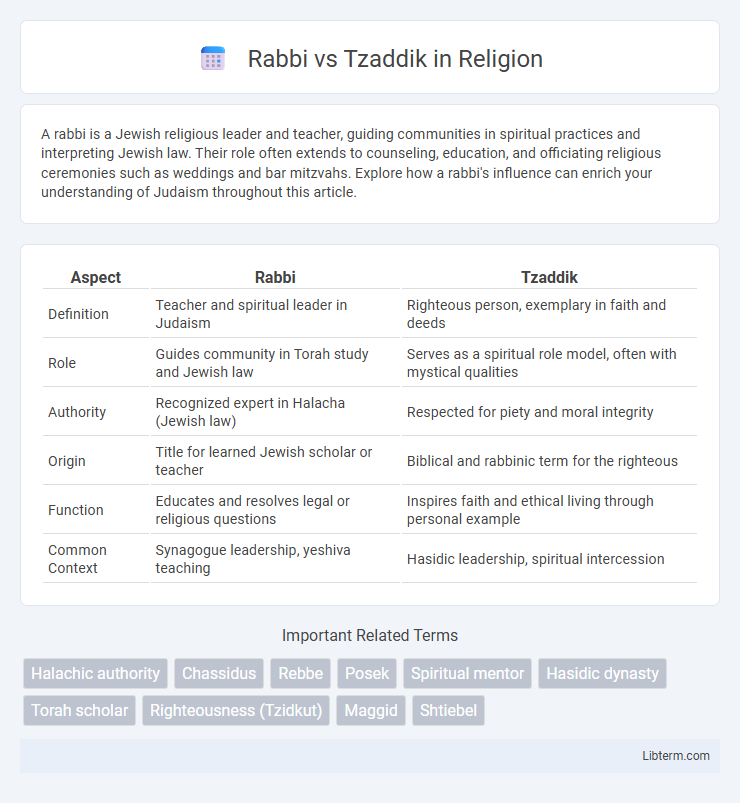A rabbi is a Jewish religious leader and teacher, guiding communities in spiritual practices and interpreting Jewish law. Their role often extends to counseling, education, and officiating religious ceremonies such as weddings and bar mitzvahs. Explore how a rabbi's influence can enrich your understanding of Judaism throughout this article.
Table of Comparison
| Aspect | Rabbi | Tzaddik |
|---|---|---|
| Definition | Teacher and spiritual leader in Judaism | Righteous person, exemplary in faith and deeds |
| Role | Guides community in Torah study and Jewish law | Serves as a spiritual role model, often with mystical qualities |
| Authority | Recognized expert in Halacha (Jewish law) | Respected for piety and moral integrity |
| Origin | Title for learned Jewish scholar or teacher | Biblical and rabbinic term for the righteous |
| Function | Educates and resolves legal or religious questions | Inspires faith and ethical living through personal example |
| Common Context | Synagogue leadership, yeshiva teaching | Hasidic leadership, spiritual intercession |
Understanding the Terminology: Rabbi vs Tzaddik
A Rabbi is a Jewish religious leader and teacher specializing in Jewish law, Torah study, and community guidance, serving as an authoritative figure in questions of Halacha. A Tzaddik is a righteous person recognized for exceptional spiritual piety and moral integrity, often considered a spiritual mentor or role model within Hasidic and Kabbalistic traditions. Understanding these terms highlights the distinction between legal-religious scholarship embodied by a Rabbi and the altruistic, saintly qualities attributed to a Tzaddik.
Historical Origins of Rabbis and Tzaddikim
The historical origins of rabbis trace back to the Pharisaic leadership in Second Temple Judaism, evolving as religious teachers and interpreters of Jewish law after the Temple's destruction in 70 CE. Tzaddikim, deeply rooted in Hasidic tradition emerging in 18th-century Eastern Europe, are spiritual leaders regarded as righteous individuals with mystical authority and a direct connection to the divine. While rabbis primarily function as legal scholars and community teachers, tzaddikim serve as spiritual guides, emphasizing piety and divine inspiration within Jewish mystical frameworks.
Roles and Responsibilities: Rabbi Explained
A Rabbi serves as a spiritual leader, educator, and interpreter of Jewish law, guiding the community through religious teachings, ethical advice, and Torah study. Responsibilities include officiating life-cycle events such as weddings and bar mitzvahs, providing pastoral care, and resolving halachic questions with authority. Unlike a Tzaddik, whose role centers on personal righteousness and mystical leadership, a Rabbi's primary function revolves around communal instruction and halachic decision-making.
The Spiritual Authority of the Tzaddik
The Tzaddik holds a unique spiritual authority in Jewish tradition as a righteous individual believed to possess a deep, divine connection that enables them to intercede on behalf of their community. Unlike a Rabbi, whose authority often stems from scholarly knowledge and halachic expertise, the Tzaddik's influence is rooted in mysticism, spiritual purity, and personal piety. Their role as a spiritual guide transcends legal interpretation, offering a conduit for divine blessings and transformative spiritual guidance.
Educational Backgrounds: Rabbi and Tzaddik Compared
A Rabbi typically undergoes extensive formal education in Jewish law, Talmudic studies, and Halacha, often attending yeshivas or rabbinical seminaries to earn ordination (semicha). A Tzaddik, while deeply knowledgeable in Torah and spiritual matters, is primarily recognized for exceptional piety, mystical insight, and righteous behavior rather than formal credentials. Educational backgrounds of Rabbis emphasize scholarly achievement and legal expertise, whereas Tzaddikim embody spiritual perfection and guidance rooted in personal holiness and divine inspiration.
Community Leadership and Influence
A Rabbi serves as a spiritual leader and teacher within the Jewish community, providing guidance in religious law, prayer, and ethics. A Tzaddik, often regarded as a righteous and spiritually elevated individual, influences through personal piety and mystical insight, inspiring followers by example rather than formal instruction. Both roles shape community values, with Rabbis leading structured study and practice, while Tzaddikim foster deep spiritual connection and moral aspiration.
Mystical Dimensions: The Tzaddik in Hasidism
The Tzaddik in Hasidism represents a mystical conduit between the Divine and the community, embodying spiritual elevation and channeling divine energy. Unlike a Rabbi, who primarily serves as a legal decisor and teacher, the Tzaddik is viewed as a spiritual intercessor whose inner sanctity enables transcendent mystical influence. This role emphasizes the Tzaddik's unique ability to transform and elevate the collective soul through deep Kabbalistic connections and Hasidic devotion.
The Rabbi’s Role in Halacha and Jewish Law
The Rabbi plays a crucial role in interpreting and applying Halacha, serving as a legal authority who guides the community in matters of Jewish law and practice. While a Tzaddik is revered for spiritual righteousness and moral excellence, the Rabbi's expertise lies in detailed legal knowledge and decision-making within Halachic frameworks. Their responsibilities include issuing responsa (teshuvot), teaching Torah law, and ensuring community adherence to Halachic standards.
Tzaddikim as Spiritual Mentors and Guides
Tzaddikim serve as profound spiritual mentors and guides, embodying righteous qualities and deep mystical wisdom that inspire personal growth and divine connection. Unlike rabbis who primarily focus on teaching Halacha and leading community rituals, Tzaddikim provide individualized spiritual guidance, healing, and elevate souls through their exemplary piety. Their role often includes interceding with divine energies, offering followers a transformative pathway toward holiness and ethical perfection.
Contemporary Relevance: Rabbi and Tzaddik Today
Today, both rabbis and tzaddikim continue to shape Jewish spiritual life, with rabbis serving as knowledgeable teachers and community leaders guiding religious practice, while tzaddikim often embody deep mystical devotion and moral perfection inspiring personal and communal transformation. In modern communities, rabbis address contemporary ethical challenges and interpret Halacha, whereas tzaddikim provide spiritual guidance through example and intercession, enhancing Jewish identity and resilience. Their complementary roles remain vital in sustaining religious continuity, promoting ethical values, and nurturing a living connection to Jewish tradition.
Rabbi Infographic

 libterm.com
libterm.com